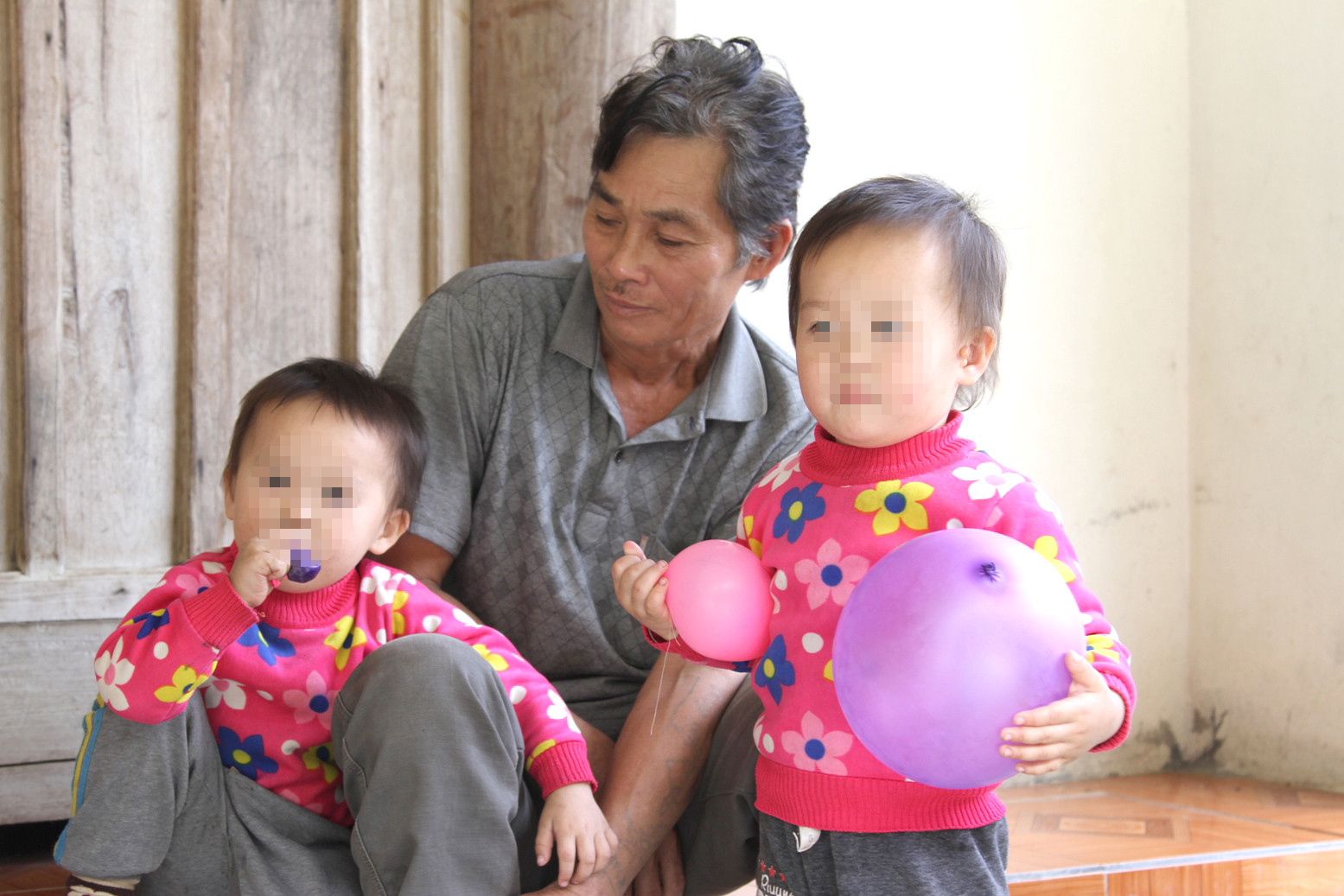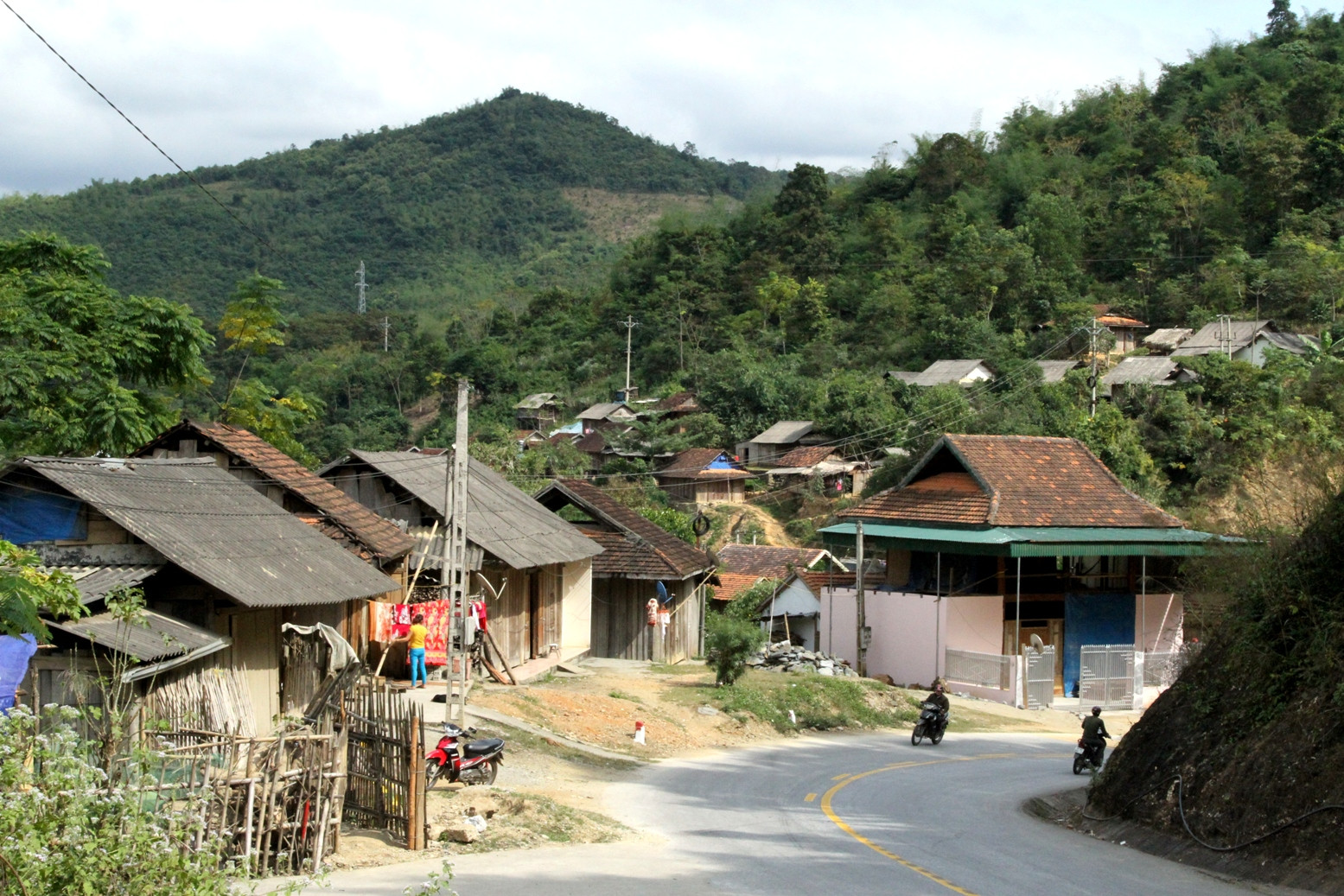Mixed-race children in Western Nghe An
(Baonghean.vn) - The children have a Chinese father and a Vietnamese mother, but their marriages broke down and life in a foreign land was not as they had initially imagined, so the young girls brought their children back to Vietnam to live.
Children of mixed blood
Ms. Mac Thi Hong (born in 1983), residing in Ang village, Xa Luong commune, Tuong Duong district, went to China to work as a worker 6 years ago. 3 years ago, she met a worker in the same company named Da Ngau, from Guangdong province, China near where she was staying, and they got married.
Although they were husband and wife, they did not register their marriage. When the baby girl was about 10 months old, Hong brought her back to Vietnam, registered her mother's last name, named her Mac Thi KC, and gave her to her grandmother to raise, while she continued to go to China to make a living.
 |
| Two Vietnamese-Chinese twin children are playing with their grandfather in Xa Luong commune (Tuong Duong). Photo: Ha Thu |
“For over 3 years, I have worked hard to raise my grandchild. Raising him is harder than raising my biological children combined. He is very shy and not as bold as his peers. Maybe it is because he has foreign blood that he is like that,” Ms. Lan sighed and shared.
Also in Ang village, following the village chief Lo Kham Nhun, we approached the house of Mr. Luong Van Ha (born in 1974). The small house, which had been precariously perched on the hillside for several years, "suddenly" received two more people, just a year after his eldest daughter followed her friends to China to find a husband.
Only 23 years old this year, but looking at Luong Thi Quyen, Ha's daughter, she looks like a young girl in her twenties with makeup and modern clothes, no less than the girls in the city. It is even more unbelievable when Quyen is already the mother of two children, this year over 2 years old. Through the story of this mountain girl, it is known that in 2014, listening to the invitation of friends, Quyen left home to go to China to work as a factory worker and find a husband, with the promise of high salary and easy work.
Here, with her good looks, Quyen quickly married a welder (whose name she still can't remember, only that he was born in 1991). Quyen gave birth to twin daughters, and her husband's family sent her back to Vietnam to take care of them. Quyen registered both of her children under her mother's surname.
When we asked about her marital status, this Thai girl born in 1994 always affirmed that the couple still kept in touch regularly, but "accidentally" said that her marriage only lasted 7 months, plus the first month before the "wedding", and since then they have never met.
Mr. Luong Van Ha also shrugged and shook his head when we asked to know the truth about Quyen’s marital status. Like many other grandparents in this area whose daughters married Chinese men, the family had never seen their son-in-law’s face, while having to work hard to raise their grandchild in poverty since he was a baby.
 |
| A corner of Ang village, where eight Vietnamese women married Chinese men. Photo: Ha Thu |
Mr. Luong Van Phang - Chairman of Xa Luong Commune People's Committee added that every year, hundreds of women in the commune leave their villages to go to China to work, some return with their children, most of them voluntarily leave. In July 2017, there was a case of Mac Thi Khuong who brought her child back to report to the authorities that she was tricked and sold, but when investigated, it was not so, but she voluntarily left.
Consequences of broken dreams of foreign husband
Lieutenant Colonel Tran Phuc Tu - Head of Tuong Duong District Police said that the problem of human trafficking in recent times in this border district continues to be complicated. One of the obvious consequences is that many mountain girls go to the other side of the border, marry and give birth to children for local people, then return to Vietnam to give birth or give birth there and bring the children back to this side to raise.
Incomplete statistics from the District Police show that there are currently at least 30 children born in such circumstances, living with their mothers or relatives in the area. Although they are of mixed Vietnamese and Chinese blood, their birth certificates all carry their mother's surname. The story of these foreign children living in the locality, most of them have lives like any other Vietnamese children, but there are also many tumultuous cases. The most typical is the story of Vi Thi Hien (born 1992), residing in Hoa Binh town, Tuong Duong district.
In 2014, Hien was tricked and sold to China to marry a local man. During her stay, she had a daughter with her husband there, then this mountain girl took her child and returned to Vietnam. At that time, the baby was only 3 months old, and she had not yet had time to register the birth or give a name. After more than a year of being tricked and sold, when she returned, both her father, mother and brother were in trouble with the law for drugs, and their house was gone.
Having no place to go, Hien had to send her child to an acquaintance in Ky Son district to raise, while she continued to cross the border to make a living. The person who adopted the child was Mrs. Luong Thi Binh, who registered the child's birth with her surname. After 3 years, Vi Thi Hien returned to claim her child back but was unsuccessful, so she filed a lawsuit in court. After 2 levels of trial, the court ordered Mrs. Binh to return the child to her biological mother, because a DNA test showed that the child was Hien's biological child. However, being asked for more than 200 million VND in child support, this mountain girl could not afford it, so she had to accept losing her child.
In Ky Son district, the situation of women leaving their villages to go to China to get married, then bringing their children back to live in the area is also quite painful. Captain Kha Van Hien - Head of the General Investigation Team, Ky Son District Police said that according to incomplete statistics, there are dozens of cases of women bringing their children from China to live in the area. However, the difficulty is that these subjects do not declare, return for a while and then continue to return to China to make a living, so the number fluctuates frequently.
Recently, there has been a situation of pregnant women being sold to China, not simply married, giving birth in a foreign country and then brought back to their homeland to raise. Such changes, although not causing any disturbance or difficulty for the police force in maintaining security and order in the area, have also given rise to many potential problems related to the crime of buying and selling women and children, which has been a headache in the border districts of Western Nghe An in recent years.

